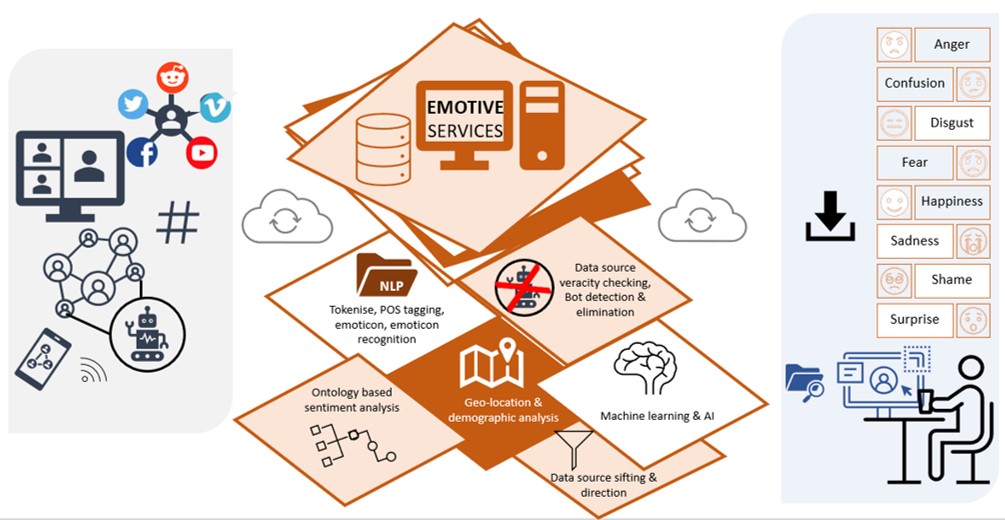Background
EMOTIVE is a specialist analytics service for extracting and detecting fine-grained emotions in social-media posts. Our state-of-the-art semantically driven engine is unique amongst existing approaches. It can analyse thousands of posts a second to extract the presence of eight basic emotions: anger, disgust, fear, happiness, sadness, surprise, shame and confusion, and much more.

Natural Language Processing
Deeper analysis of social media posts through a unique pipeline that tokenises, tags, using ‘parts of speech’ recognition technology, and translates emoticons.
Bot Detection
Detect bots using a combination of technology and human intervention through our veracity checking service.
Geo-mapping
Geo-locate social media posts through embedded geo-tags in social media posts and through account details inference to provide the context and weighted relevance of the social media posts.
Machine learning AI
Detect vernacular changes and automatically revise the NLP, so even if your customers’ language changes, EMOTIVE can still understand it.
Data source sifting & direction
Data source sifting & direction
Remove SPAM and noise from analysis to provide a clearer picture of the customers emotions towards the product or service.
Ontology: Emotion Analysis
Detect 8 different cross cultural emotions through leading edge EMOTIVE ontologies that capture and classifies consumers’ emotions.
Reports
An extensive set of reports with insight on the campaign will be made available to individual clients.

Processing speed
Our program and the entire natural language parsing engine were optimised for big data, so that potentially all UK based Tweets comming in each second can be processed. The analysis can be further scaled on a per client basis to cover the enitre world, which represents around 10,000 tweets/sec.
Performance
EMOTIVE has been extensively tested and evaluated, achieving an F-measure - a measure commonly used to evaluate the performance of these types of systems - of 0.96, the best that has been reported for such a task.
Media Coverage
The Guardian, BBC News, Voice of America, Daily Mail, The Independent, ITN, The Drum, Irish Examiner, Evening Express, Yorkshire Post, Istockanalyst.com, Tmcnet.com, UPI.com, Home.bt.com, Talktalk.com, CorpComms, Bild, AllAnalytics.com, BigData4Analytics, ...
Academic Research
M Sykora, S Elayan, IR Hodgkinson, TW Jackson, A West, 2022. The power of emotions: Leveraging user generated content for customer experience management. Journal of Business Research 144, 997-1006
M Sykora, S Elayan, N Perri, T Jackson. 2020. Tweeting Brexit: A Computational Analysis of Public Mood During the Brexit Negotiations 7th European Conference on Social Media ECSM 2020, 288
Sykora M., Jackson T. W., O'Brien A., Elayan S. and Lunen A. v., 2014. Twitter based Analysis of Public, Fine-Grained Emotional Reactions to Significant Events, European Conference on Social Media - ECSM, Brighton, United Kingdom, July 2014
Sykora M., Jackson T. W., O'Brien A. and Elayan S., 2013. Emotive Ontology: Extracting Fine-Grained Emotions from Terse, Informal Messages, IADIS International Journal on Computer Science and Information Systems, ISSN: 1646-3692, Vol 8, No. 2, pp. 106-118
Sykora M., Jackson T. W., O'Brien A. and Elayan S., 2013. National Security and Social Media Monitoring: A Presentation of the EMOTIVE and Related Systems, IEEE European Intelligence and Security Informatics Conference 2013, Uppsala, Sweden
Sykora M., Jackson T. W., O'Brien A. and Elayan S., 2013. EMOTIVE Ontology: Extracting Fine-Grained Emotions from Terse, Informal Messages, IADIS International Conference on Intelligent Systems and Agents 2013, Prague, Czech Republic